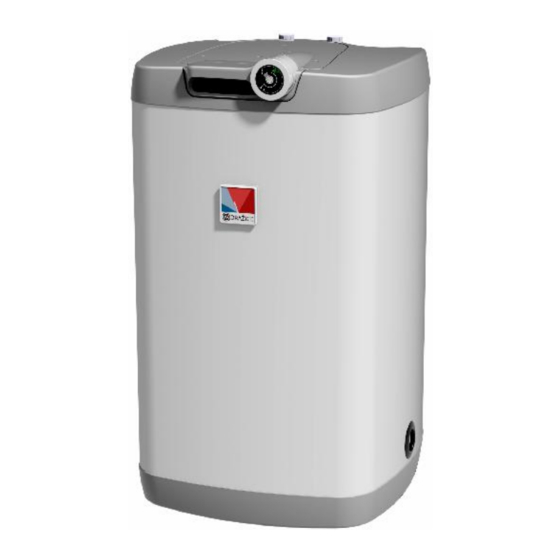Drazice OKH 160 NTR Instrukcja obsługi i instalacji - Strona 8
Przeglądaj online lub pobierz pdf Instrukcja obsługi i instalacji dla Podgrzewacz wody Drazice OKH 160 NTR. Drazice OKH 160 NTR 14 stron. Tank type indirect water heaters
Również dla Drazice OKH 160 NTR: Instrukcja obsługi i instalacji (16 strony), Instrukcja obsługi i instalacji (17 strony), Instrukcja obsługi i instalacji (12 strony)

2 OPERATION AND FITTING INSTRUCTIONS
2.1 OPERATING CONDITIONS
The tank shall only be used in accordance with the conditions specified on the performance
plate and in instructions for electric wiring.
regulations and standards, also conditions for connection defined in local electric and water
works have to be adhered to, as well as the installation and operation manual. The room, in
which the appliance will be operated, must be frost-free. The appliance has to be mounted
at a convenient place, it means that the appliance must be easily available for potential
necessary maintenance, repair or replacement, as the case may be.
If water is strongly calcareous we recommend that any of the common decalcifying devices
was installed with the appliance, or the thermostat to be set to minimum operation
temperature of 60
used. To avoid potential sediments we recommend that the device was installed together
with a water filter.
2.2 PLUMBING FIXTURE
Connecting heaters into water system in shown in Figure 5. For potential disconnection of
the heater, the service water inlets and outlets must be provided with screw coupling Js
3/4".If the hot service water (HSW) distribution is equipped with circulation circuit, the
reverse pipe is connected to the inlet identified as CIRCULATION. The 100, 125, 160 NTR and
100, 125, 160 NTR / HV types are equipped with a discharge outlet. For operation, the
heater must be equipped with a safety valve. Safety valve is mounted on the cold water inlet
identified with a blue ring
Each hot service water pressure heater must have a safety valve with a membrane spring.
The safety valve must be easily accessible, as close to the heater as possible. The input pipes
must have at least the same clearance as the safety valve. The safety valve is placed high
enough to secure dripping water drain by gravity. We recommend mounting the safety valve
onto a branch pipe. This allows easier exchange without having to drain the water from the
heater. Safety valves with fixed pressure settings from the manufacturer are used for the
assembly. Starting pressure of a safety valve must be identical to the maximum allowed
heater pressure, and at least 20% higher than the maximum pressure in the water main - see
(Table 2). If the water main pressure exceeds such value, a reduction valve must be added to
the system. No stop valves can be put between the heater and the safety valve. During the
assembly, follow the guide provided by the safety equipment manufacturer
It is necessary to check the safety valve each time before putting it into operation. It is
checked by manual moving of the membrane from the seat, turning the make-and-break
device button always in the direction of the arrow. After being turned, the button must click
back into a notch. Proper function of the make-and-break device results in water draining
through the safety valve outlet pipe. In common operation, such a check needs to be
implemented at least once a month, and after each heater shutdown for more than 5 days.
o
C. For proper operation, drinkable water of adequate quality shall be
Besides legally acknowledged national
- 8 -
